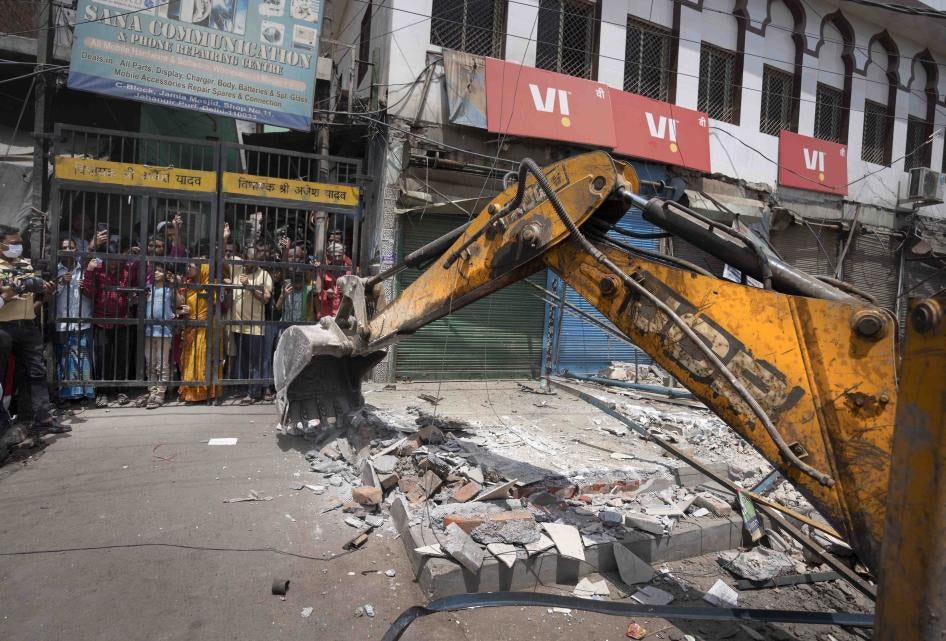(Jakarta) – Indian authorities intensified and broadened their crackdown on activist groups and the media in 2022, Human Rights Watch said today in its World Report 2023. The Hindu nationalist Bharatiya Janata Party (BJP)-led government used abusive and discriminatory policies to repress Muslims and other minorities.
Authorities throughout India arrested activists, journalists, and other critics of the government on politically motivated criminal charges, including of terrorism. They harassed rights groups through tax raids, allegations of financial irregularities, and use of the Foreign Contribution Regulation Act, which regulates foreign funding of nongovernmental organizations. The authorities in several BJP-ruled states demolished Muslim homes and properties without legal authorization or due process as summary punishment for protests or alleged crimes.
“The BJP government’s promotion of Hindu majoritarian ideology provokes authorities and supporters to engage in discriminatory and at times violent actions against religious minorities,” said Meenakshi Ganguly, South Asia director at Human Rights Watch. “The authorities should be reining in party members and supporters responsible for abuses instead of jailing critics and shutting down rights groups.”
In the 712-page World Report 2023, its 33rd edition, Human Rights Watch reviews human rights practices in close to 100 countries. In her introductory essay, acting Executive Director Tirana Hassan says that in a world in which power has shifted, it is no longer possible to rely on a small group of mostly Global North governments to defend human rights. The world’s mobilization around Russia’s war in Ukraine reminds us of the extraordinary potential when governments realize their human rights obligations on a global scale. The responsibility is on individual countries, big and small, to apply a human rights framework to their policies, and then work together to protect and promote human rights.
Indian authorities misused laws forbidding forced religious conversion to target Christians, especially from Dalit and Adivasi communities. In August, the BJP government approved the early release of 11 Hindu men sentenced to life in prison for the gang rape of a pregnant Muslim woman and murder of 14 members of her family during the 2002 anti-Muslim riots. BJP affiliates celebrated publicly, prompting widespread condemnation. The action highlighted the government’s discriminatory stance toward minority communities even in cases of violence against women.
Three years after the government revoked Jammu and Kashmir’s constitutional autonomous status and split it into two federally governed territories, the government continued to restrict free expression, peaceful assembly, and other basic rights there. The authorities invoked the Jammu and Kashmir Public Safety Act, as well as terrorism allegations under the Unlawful Activities Prevention Act, to conduct raids and arbitrarily detain journalists and activists and even barred a Pulitzer prize-winning Kashmiri journalist from leaving India without justification. Suspected militants attacked minority Hindu and Sikh communities in the Muslim-majority Kashmir Valley.
In an interim ruling in May, the Supreme Court halted all use of the colonial-era sedition law, which has repeatedly been used to arrest critics of the government. The Supreme Court also expanded access to legal abortion to all women regardless of marital status and to people other than cisgender women. It widened the definition of family to include same-sex couples, single parents, and other households considered “atypical,” extending family benefits to them.
In a significant step to protect survivors of sexual assault, the Supreme Court banned the degrading “two-finger test,” akin to virginity testing, which was used on survivors of sexual assault or rape to determine whether they were “virgin” or “habituated to sexual intercourse,” saying that anyone who conducts the practice will be guilty of misconduct.
In September, the Supreme Court did not reach a verdict on whether Muslim female students can wear a hijab, a headscarf, in educational institutions in BJP-led Karnataka state, with two judges expressing opposing views.
During India’s Universal Periodic Review at the United Nations Human Rights Council in November, member countries raised concerns and made recommendations on a range of issues including the need to protect minority communities and vulnerable groups, tackle gender-based violence, uphold civil society freedoms, protect human rights defenders, and end torture in custody.








